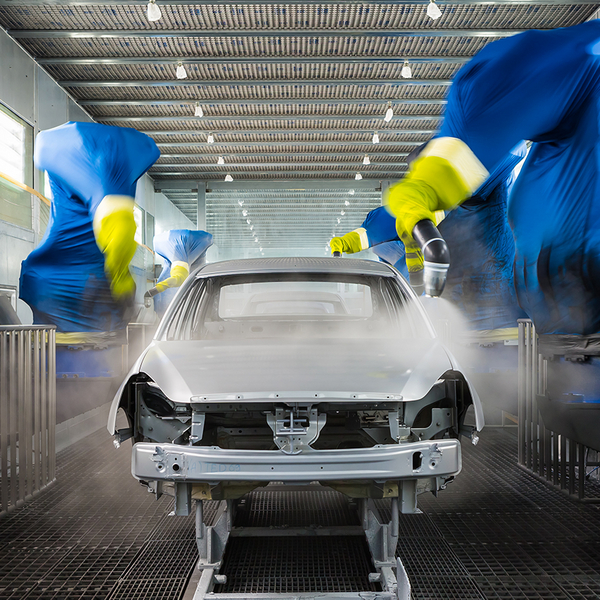
Automotive/Aerospace
The automotive and aerospace industries produce different types of process water.
Typical producers of production water are:
- Machining of drive or gear parts
- Die casting
- Electroplating
- Painting
- Maintenance
- Maintenance or overhaul of wear parts on commercial vehicles, locomotives and wagons, and aircraft

Integrate process water treatment into your production
Before maintenance and in the course of production, the parts are cleaned [link to MRO (Maintenance, Repair, Overhauling)]. The resulting process water usually contains oil due to the lubricants. The cleaning process optimally prepares the components for the subsequent processes.
In aviation, the recycling of spent deicing chemicals at airports is particularly important. The glycol-water mixture often contains polypropylene glycol or polyethylene glycol. With the right process water treatment, this process water can be treated optimally.
Typical Process water types:
- emulsions (coolants and lubricants)
- release agents (aluminum die casting)
- wash waters, rinsing and active baths
- electroplating, hardening and grinding waters
- rinsing water from crack detection systems
- recycling of de-icing chemicals at airports
- floor cleaning waters
Benefit from the advantages of process water treatment
With KMU LOFT Cleanwater's evaporator technology, the parts are cleaned in such a way that up to 99% recyclable distillate can be produced. Especially in washing and cleaning applications, it can be recycled and reused in the manufacturing process. Recirculation of make-up water for emulsion and release agent is also possible.
KMU LOFT Cleanwater develops for its customers a tailored complete solution to their processes and the process water.
Environmentally friendly
Environmentally friendly due to up to 99% water savings and extensive avoidance of chemical use.
Constant distillate quality
Constant distillate quality possible even with fluctuating wastewater composition.
Low energy costs
Reduction of energy and operating costs.
Inexpensive disposal
Disposal volume is reduced many times compared to other wastewater treatment processes.
Automation
Very high level of automation with only about 15 - 30 minutes of operation and maintenance per day.
Occupational safety
Process-safe wastewater treatment and occupational safety independent of chemical knowledge of plant operators.
![[Translate to Englisch:]](/fileadmin/user_upload/kmu_header_navigation_produkte.jpg)
![[Translate to Englisch:]](/fileadmin/user_upload/kmu-loft_loesungen_navigation5.jpg)
![[Translate to Englisch:]](/fileadmin/user_upload/kmu_header_navigation_industrien.jpg)
![[Translate to Englisch:]](/fileadmin/user_upload/kmu_header_navigation_service.jpg)
![[Translate to Englisch:]](/fileadmin/user_upload/kmu_header_navigation_ueberuns_final.jpg)
![[Translate to Englisch:]](/fileadmin/user_upload/kmu_header_navigation_nachhaltigkeit-og.jpg)

